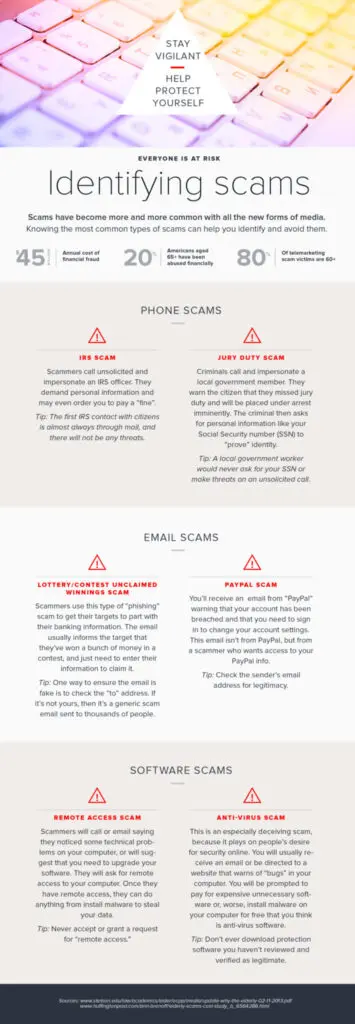Financial elder abuse is when an older adult is financially exploited by a stranger. It’s even worse when it’s someone they know, like a family member or caregiver. Financial elder abuse crosses all social, educational, and economic boundaries.
My mom’s phone rang one fall morning.
“Grandma?” asked the male voice on the other end.
“Mark?” Mom asked. Since our son’s death, the only man to call her Grandma was Bobby’s best friend, Mark.
“Yeah. I’m in trouble.”
“What’s wrong?”
The young man explained that he’d been in a traffic accident and was in jail. He needed to have money wired to him via Western Union.
“What about your folks?”
“Oh, no, I can’t ask them right now. They’d be really upset.”
My mom explained that she’d need to get a ride to the nearest Western Union, since she no longer drove.
Thank goodness she called me immediately. I told her that Mark would never ask her to wire money, regardless of the reason. He’d go to his parents before anyone else. I reminded her that scam artists prey on vulnerable seniors like herself.
Thirty minutes later, the bold con artist called back.
“Have you wired the money yet, Grandma?”
Mom answered, “Sorry, no. You’re going to have to stay in jail.”
The person at the other end called her a name, then hung up. I’m glad my mom called me before following through with wiring any money.
The Centers for Disease Control and Prevention report that over 500,000 seniors are the victims of elder financial abuse every year. The number could actually be higher, since many elders don’t report being victimized. They’re embarrassed and ashamed.
I read a story about a son who took advantage of his mother’s trust. He conspired with the family’s “trusted” financial advisor to move his mother’s investments, and then took out a loan against them. The transaction garnered a huge commission for the broker and provided funds the son needed to start a business. But the son had no intention of paying back the loan.
If your parents are still living independently, make sure you review common scams with them. Also be alert to signs of possible financial exploitation, such as:
- Terminating vital utilities such as telephone, water, electricity / gas, or garbage
- Not paying bills and liabilities despite adequate income
- Surrendering oversight of finances to others without explanation or consent
- Transferring assets to new “friends” assisting with finances
- Writing checks to “Cash”
- Not understanding his/her current finances, and offering improbable explanations
- Unexplained disappearance of cash, valuable objects, financial statements
- Not being able to explain unauthorized changes to wills or other estate documents
- Giving away money or spending promiscuously
- Receiving property liens or foreclosure notices
As a caregiver, it’s imperative to watch for potential scams perpetrated on older adults. Be especially aware if your loved one shows signs of memory loss and can’t handle his finances. Alert your parents’ bank. Ask that a fraud memo be placed on their accounts and require a password before giving any information over the phone. If you think your loved one has been taken advantage of, call your local police department. Then call the three credit reporting agencies and place a freeze on his credit report.*
It can be uncomfortable to discuss financial matters with your aging loved one. It isn’t usually high on our list of fun things to do. Broach the subject with humility. Be prepared for some push-back. Above all, pray before every financial discussion.
*The three credit reporting agencies are Experian, Equifax and TransUnion.


Christian Author, Jane S. Daly
After a successful career in banking, Jane dipped her toes into writing after a life-changing event – the death of her 30-year-old son. Her book, Because of Grace, has given hope to many mothers who have experienced the same shattering grief. The Caregiving Season was born from the years spent caring for her elderly mother. This original Caregiving Blog was published during her caregiving years.
Now with seven novels published, Jane is addicted to coffee, purple pens, and her husband, not necessarily in that order. A self-proclaimed introvert, she enjoys the solitude of riding shotgun in Rigsby, her 37-foot motor home. But when they pull into a new campground, her favorite thing is to make new friends and find hangouts featuring local musicians. Her fantasy involves writing lyrics for country music songs and hearing them played on the radio. In the meantime, she’ll stick to writing novels. And seeing as much of the country as possible.
